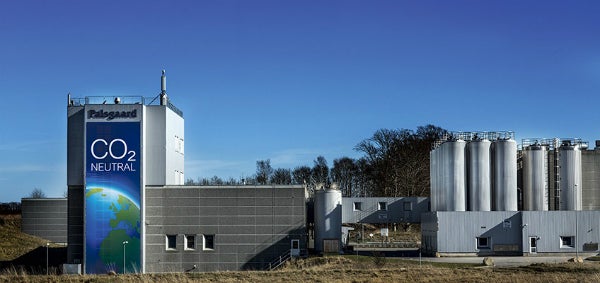
Palsgaard A/S has revealed that it achieved CO2 neutrality at its Danish plant during 2015.
The company has reconfirmed plans to achieve a zero carbon footprint worldwide at all production plants by 2020.
Celebrating today
The milestone was marked by a celebration at the company’s Danish headquarters in Juelsminde with guests that included government officials, local politicians, business people, press and scientists on 1 April 2016.
During the celebration, Anders Bjørn, PhD at the Technical University of Denmark, DTU explained why it is important that companies take active measures.
Bjørn said: "The climate challenge is enormous and current political commitments are far from sufficient to solve it.
"Therefore, it is encouraging to see Palsgaard prove that with an ambitious effort it is possible to combine energy intensive production in this country with CO2 neutrality.
"It is also positive that Palsgaard not only intends to do better in Denmark, but also has a target of CO2 neutrality for its production sites abroad and is trying to reduce environmental problems from the palm oil they purchase."
How to achieve a zero carbon footprint?
CO2 neutrality has been achieved by optimising energy consumption throughout the plant in the form of heat recovery and insulation, converting from heavy fuel oil to biogas, lighting optimisation and by making use of certified wind power.
Palsgaard also established its own straw-fired central heating systems, which have enabled the company to achieve a zero carbon footprint in Denmark five years earlier than planned.
The reduction in CO2 emissions for 2015 amounted to 16,088t, which corresponds to the typical annual emissions of approximately 4,200 Danish households.
For years, the Danish Ministry of Energy, Utilities and Climate has been determined to reduce CO2 emissions from Danish companies.
Minister for Energy, Utilities and Climate Lars Chr Lilleholt said:"Palsgaard can be an inspiration to other companies.
"Especially when it comes to demonstrating that the transition to renewable energy and energy saving measures can go hand in hand with commercial interests.
"This illustrates that green transition and growth need not be mutually exclusive. It is green realism.
"One of the reasons that we have a more efficient and energy saving industry today, is because of companies like Palsgaard, which has now achieved CO2 neutrality.
"It is quite impressive that they have managed to reduce the company’s energy consumption.
Schou Foundation CEO Birger Brix said: "We’re immensely proud to have reached this milestone, the result of extensive efforts since the goal was established in 2010.
"And we are particularly pleased to have proven that it is possible even in an industry whose production processes are energy intensive, to say the least."
Targeting tomorrow
The company, which has subsidiaries in 13 countries and a global sales representation, develops emulsifiers and other ingredients that help manufacturers to sustainably meet a range of consumer needs and to produce excellent food products.
Palsgaard CEO Jakob Thøisen said: "An achievement like our CO2 neutrality takes dedication, resources and the ability to make a long-term commitment to sustainability.
"As a foundation-owned company, we are in a unique position to make such a commitment, continuing the tradition of corporate social responsibility established by our founder over 100 years ago."
According to Jakob Thøisen, plants in the Netherlands, Mexico and Malaysia have already embarked on a similar process towards global CO2 neutrality by 2020.










